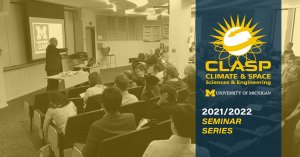Presented By: Climate and Space Sciences and Engineering
CLASP Seminar Series: Prof. Kris Karnauskas of the University of Colorado

University of Colorado Prof. Kris Karnauskas will give a lecture as part of this week's Seminar Series. Please join us!
Prof. Karnauskas's presentation is titled "The equatorial current system from underwater gliders off the Galápagos Islands" and will take place on Thursday, September 9 at 3:30 p.m. EDT.
This seminar will be in person at the Climate and Space Research Building Auditorium, Room 2246.
The seminar may also be viewed via Zoom.
Please contact lhopkins@umich to request zoom access.
ABSTRACT:
Relatively small (order 1 K) variations in the surface temperature of the eastern equatorial Pacific Ocean can cause far-reaching effects throughout the global atmosphere. For this reason, the tropical Pacific is not exactly an understudied region in the global climate dynamics community. However, knowledge of the detailed structure of the equatorial current system in the eastern Pacific has remained elusive until recently, largely due to the paucity of direct measurements—and models that suffer from insufficient resolution and severe biases in oceanographic and coupled phenomena. In particular, the termination of the Equatorial Undercurrent (EUC) as it meets the Galápagos Islands at ~92°W, which idealized experiments with numerical models suggest has profound impacts on regional circulation and climate, occurs entirely east of the array of moorings that were installed in the tropical Pacific beginning in the late 1980s. Ironically, much depends on what happens where we have managed to collect the fewest observations. To address this critical knowledge gap, we deployed and maintained a fleet of autonomous underwater gliders west of the Galápagos Islands (but east of the TAO Array) from 2013–2016. In this talk, I will share insights from the Repeat Observations by Gliders in the Equatorial Region (ROGER) campaign, including what we now know about the termination of the EUC, revised estimates of upwelling rates, characterization of instabilities, and how Kelvin waves associated with El Niño affect this circulation. In addition, I will offer a quantitative comparison between these new observations in the eastern equatorial Pacific and global climate models to characterize the evolution of mean state biases from CMIP3 to CMIP6.
Please join us!
Prof. Karnauskas's presentation is titled "The equatorial current system from underwater gliders off the Galápagos Islands" and will take place on Thursday, September 9 at 3:30 p.m. EDT.
This seminar will be in person at the Climate and Space Research Building Auditorium, Room 2246.
The seminar may also be viewed via Zoom.
Please contact lhopkins@umich to request zoom access.
ABSTRACT:
Relatively small (order 1 K) variations in the surface temperature of the eastern equatorial Pacific Ocean can cause far-reaching effects throughout the global atmosphere. For this reason, the tropical Pacific is not exactly an understudied region in the global climate dynamics community. However, knowledge of the detailed structure of the equatorial current system in the eastern Pacific has remained elusive until recently, largely due to the paucity of direct measurements—and models that suffer from insufficient resolution and severe biases in oceanographic and coupled phenomena. In particular, the termination of the Equatorial Undercurrent (EUC) as it meets the Galápagos Islands at ~92°W, which idealized experiments with numerical models suggest has profound impacts on regional circulation and climate, occurs entirely east of the array of moorings that were installed in the tropical Pacific beginning in the late 1980s. Ironically, much depends on what happens where we have managed to collect the fewest observations. To address this critical knowledge gap, we deployed and maintained a fleet of autonomous underwater gliders west of the Galápagos Islands (but east of the TAO Array) from 2013–2016. In this talk, I will share insights from the Repeat Observations by Gliders in the Equatorial Region (ROGER) campaign, including what we now know about the termination of the EUC, revised estimates of upwelling rates, characterization of instabilities, and how Kelvin waves associated with El Niño affect this circulation. In addition, I will offer a quantitative comparison between these new observations in the eastern equatorial Pacific and global climate models to characterize the evolution of mean state biases from CMIP3 to CMIP6.
Please join us!